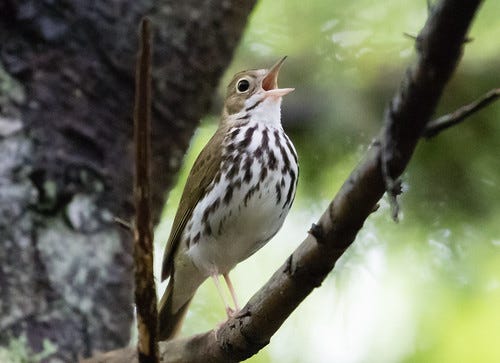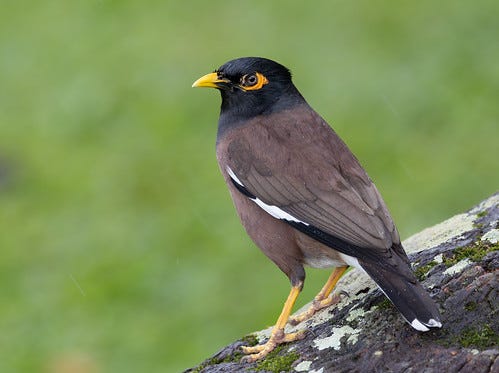(Listen to the radio version here when I record it Wednesday morning.)
On Sunday, BB, my banded Pileated Woodpecker, showed up at the feeder for a bite to eat, apparently making sure the food supply was still available in advance of the coming blizzard. On Monday, during the height of the first band of the storm, I looked out to see him at the feeder. After he’d eaten his fill, he flew to the big ash tree in the back yard, positioned himself out of the wind, and hunkered down for a good 20 minutes—maybe longer. Russ noticed him back at the feeder in mid-afternoon. And this morning, at the height of the second band of the storm, there he was again. BB’s return during this harsh weather made me think of the line, “Home is where, when you have to go there, they have to take you in.”
And suddenly I realized how timely that thought was—today is Robert Frost’s birthday. “The Death of the Hired Man” [from North of Boston, 1914] (of all Frost’s poems, the one most begging for a “Spoiler Alert!” before the title) is about an old man clinging to the last vestiges of self-respect. Fortunately, BB is sturdy and healthy, in his prime, so unlike Mary’s and Warren’s poetic conversation, Russ’s and my more prosaic one didn’t focus on frailty or desperation. Even without our feeders, BB would have come through the storm just fine.
I don’t know if BB really considers Peabody Street to be “home,” and really, we’ve never taken him in—at least, not into the house. If our little yard really does represent home for BB, the line should be, “Home is where, when you have to go there, they have nice old trees and Super Suet.”
There isn’t a metaphor or even an indirect reference to a bird in “The Death of the Hired Man,” but some of Frost’s poems are among my all-time favorite bird poems. Early every summer when I see crows and gulls scrutinizing every inch of a mown pasture where baby LeConte’s Sparrows, Northern Harriers, Upland Sandpipers, and other grassland nestlings were just massacred, I think of Frost’s “The Exposed Nest” [from Mountain Interval, 1916] in which he and his little daughter try to at least provide some shade for a nestful of helpless baby birds she discovered after he mowed the field.

In mid-summer, the time when mowing is least dangerous for nestlings and many birds have already stopped singing, I think of Frost whenever I hear Ovenbirds.
He closes “The Oven Bird” [also from Mountain Interval, 1916] with these memorable lines:
The bird would cease and be as other birds
But that he knows in singing not to sing.
The question that he frames in all but words
Is what to make of a diminished thing.
When Russ and I were in Hawaiʻi, Common Mynas were everywhere—they are one of the most ubiquitous birds in the entire state. I heard people calling them “Myna Birds” several times, making me imagine how that would sound in Robert Frost’s New England accent—perhaps exactly as he pronounced the title of his poem, “A Minor Bird” [West-Running Brook, 1928]. I’m not sure, but I found myself reciting that poem twice over our birding tour.
I have wished a bird would fly away,
And not sing by my house all day;Have clapped my hands at him from the door
When it seemed as if I could bear no more.The fault must partly have been in me.
The bird was not to blame for his key.And of course there must be something wrong
In wanting to silence any song.










Saving this one.
I am as well. Thank you.